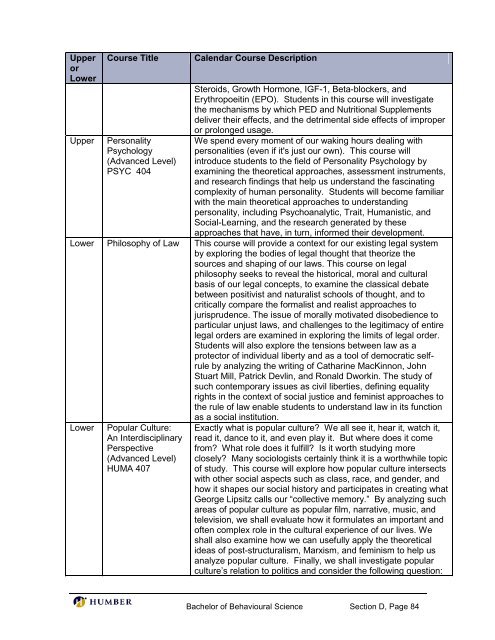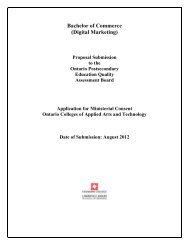Bachelor of Behavioural Science - Postsecondary Education Quality ...
Bachelor of Behavioural Science - Postsecondary Education Quality ...
Bachelor of Behavioural Science - Postsecondary Education Quality ...
You also want an ePaper? Increase the reach of your titles
YUMPU automatically turns print PDFs into web optimized ePapers that Google loves.
Upper<br />
or<br />
Lower<br />
Upper<br />
Course Title<br />
Personality<br />
Psychology<br />
(Advanced Level)<br />
PSYC 404<br />
Calendar Course Description<br />
Steroids, Growth Hormone, IGF-1, Beta-blockers, and<br />
Erythropoeitin (EPO). Students in this course will investigate<br />
the mechanisms by which PED and Nutritional Supplements<br />
deliver their effects, and the detrimental side effects <strong>of</strong> improper<br />
or prolonged usage.<br />
We spend every moment <strong>of</strong> our waking hours dealing with<br />
personalities (even if it's just our own). This course will<br />
introduce students to the field <strong>of</strong> Personality Psychology by<br />
examining the theoretical approaches, assessment instruments,<br />
and research findings that help us understand the fascinating<br />
complexity <strong>of</strong> human personality. Students will become familiar<br />
with the main theoretical approaches to understanding<br />
personality, including Psychoanalytic, Trait, Humanistic, and<br />
Social-Learning, and the research generated by these<br />
approaches that have, in turn, informed their development.<br />
Lower Philosophy <strong>of</strong> Law This course will provide a context for our existing legal system<br />
by exploring the bodies <strong>of</strong> legal thought that theorize the<br />
sources and shaping <strong>of</strong> our laws. This course on legal<br />
philosophy seeks to reveal the historical, moral and cultural<br />
basis <strong>of</strong> our legal concepts, to examine the classical debate<br />
between positivist and naturalist schools <strong>of</strong> thought, and to<br />
critically compare the formalist and realist approaches to<br />
jurisprudence. The issue <strong>of</strong> morally motivated disobedience to<br />
particular unjust laws, and challenges to the legitimacy <strong>of</strong> entire<br />
legal orders are examined in exploring the limits <strong>of</strong> legal order.<br />
Students will also explore the tensions between law as a<br />
protector <strong>of</strong> individual liberty and as a tool <strong>of</strong> democratic selfrule<br />
by analyzing the writing <strong>of</strong> Catharine MacKinnon, John<br />
Stuart Mill, Patrick Devlin, and Ronald Dworkin. The study <strong>of</strong><br />
such contemporary issues as civil liberties, defining equality<br />
rights in the context <strong>of</strong> social justice and feminist approaches to<br />
the rule <strong>of</strong> law enable students to understand law in its function<br />
as a social institution.<br />
Lower<br />
Popular Culture:<br />
An Interdisciplinary<br />
Perspective<br />
(Advanced Level)<br />
HUMA 407<br />
Exactly what is popular culture We all see it, hear it, watch it,<br />
read it, dance to it, and even play it. But where does it come<br />
from What role does it fulfill Is it worth studying more<br />
closely Many sociologists certainly think it is a worthwhile topic<br />
<strong>of</strong> study. This course will explore how popular culture intersects<br />
with other social aspects such as class, race, and gender, and<br />
how it shapes our social history and participates in creating what<br />
George Lipsitz calls our ―collective memory.‖ By analyzing such<br />
areas <strong>of</strong> popular culture as popular film, narrative, music, and<br />
television, we shall evaluate how it formulates an important and<br />
<strong>of</strong>ten complex role in the cultural experience <strong>of</strong> our lives. We<br />
shall also examine how we can usefully apply the theoretical<br />
ideas <strong>of</strong> post-structuralism, Marxism, and feminism to help us<br />
analyze popular culture. Finally, we shall investigate popular<br />
culture‘s relation to politics and consider the following question:<br />
<strong>Bachelor</strong> <strong>of</strong> <strong>Behavioural</strong> <strong>Science</strong> Section D, Page 84
















